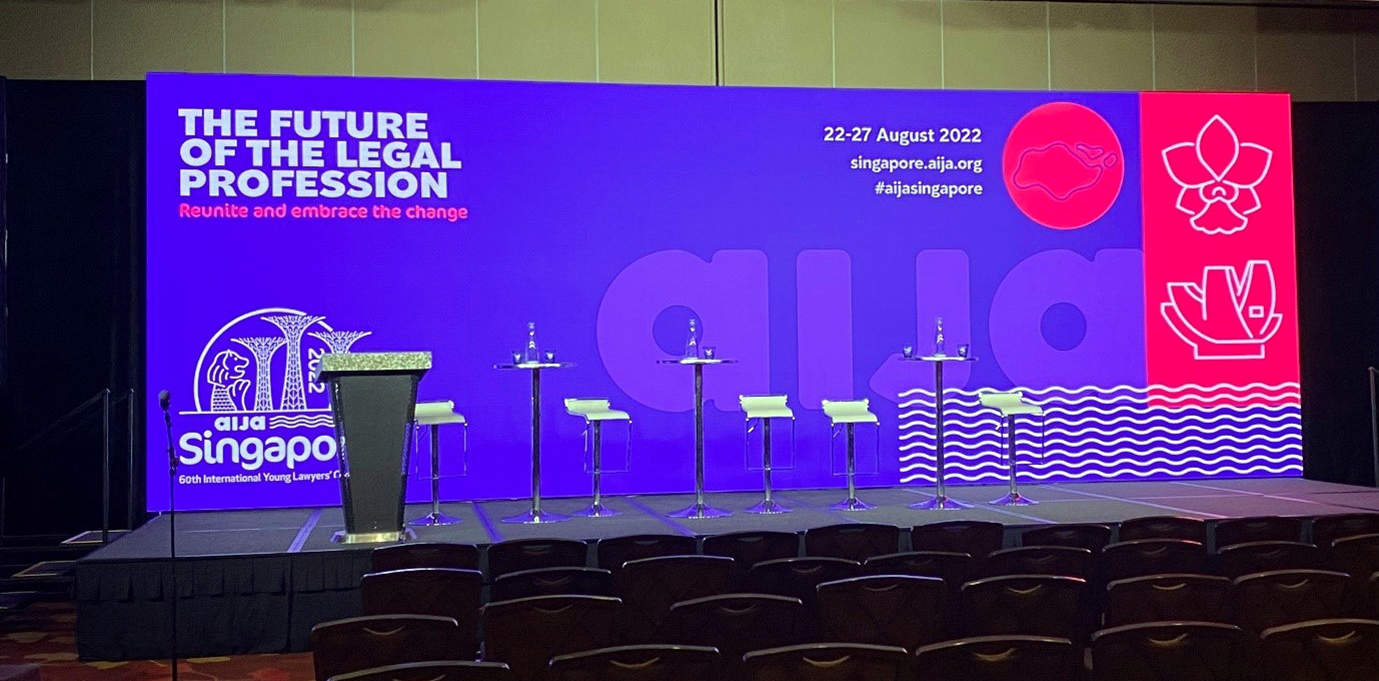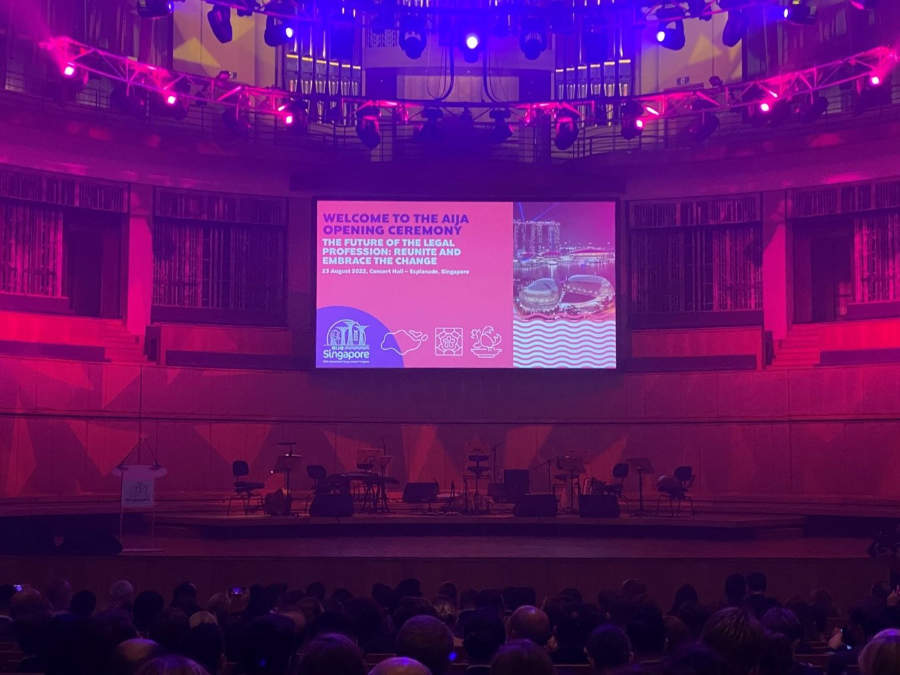
AIJA 60th Annual Congress 2022: The Future of the Legal Profession
From 22 to 27 August 2022, I had the privilege of attending the 60th International Young Lawyers’ Congress organised by the International Association of Young Lawyers (AIJA) under the generous sponsorship of the Law Society of Singapore. This 60th iteration of the Congress gathered over 400 international lawyers from more than 50 jurisdictions, some in Singapore for the first time, but all eager to experience what Singapore has to offer both in and out of its legal sphere.
In this week-long Congress, delegates were hosted at the Sands Expo and Convention Centre and various social venues throughout our city-state. To say that it was surreal seeing a crowd of faces in a single space is undoubtedly an understatement – this must also have been on the minds of my fellow delegates, as the social energy to connect in person with our legal peers from all over the world was palpable after more than two years of pandemic isolation. For me, this was also my first in-person legal conference since having been called to the Singapore Bar virtually on Zoom in August 2020.
The theme for this year’s Congress was “The Future of the Legal Profession: Reunite and Embrace the Change”. While much has already been said in recent times on how the legal profession has had to embrace the use of technology to overcome the restrictions brought about by the pandemic, AIJA successfully organised 15 informative and interesting sessions on the future of the legal profession especially targeted towards young international lawyers. Some of the topics covered in the sessions that I attended included the future of the mergers and acquisitions deal process, legal project management and the potential of automated workflows and virtual dispute resolution in Asia.
This theme of the Congress was illustrated clearly and explored thoroughly in the course of the week. From the very beginning at the Welcome Address and Opening Plenary Session, speaker Dan Jasnow from Arentfox Schiff in the United States appeared as an avatar in the virtual world of the Metaverse alongside other panellist speakers who appeared in person. He showed us around the virtual world that he was in, including spaces that could be purchased via tokens as investments in the real world. It turns out that Arentfox Schiff has purchased a digital plot of land in the fashion and retail district of browser-based 3D platform Decentraland and has opened a virtual office! In relation to this move, the firm has also helped its clients develop a presence in the Metaverse. In my view, this bold and untested move represents the fading of boundaries that the legal profession once had to work within. The future of the legal profession now requires rethinking of concepts such as physical spaces that we once took for granted and demands that we prepare ourselves as legal professionals for types of work that go beyond the real world.

Seminars held at the Sands Expo and Convention Centre
“Perhaps the day will come when a client asks to communicate with the attorney via e-mail, or the attorney wants to use the Internet to increase marketing presence, to “meet” online with other lawyers, or even just to exchange e-mail with his or her child in college.” This was a quote featured in Jasnow’s presentation extracted from ‘Why Lawyers Need to Use the Internet’ (Colorado Lawyer, Vol 25, No 4, p 51) by David Thomson in April 1996. Albeit likely an idealistic statement made back in 1996, this statement unsurprisingly amused the crowd of delegates at the Congress. It was refreshing to realise that, just over two decades ago, even the concept of exchanging e-mails was foreign to and perhaps daunting to legal professionals. In another decade or so, perhaps the manner in which we practise law would have changed fundamentally in ways we cannot even comprehend today! With this perspective, it is important that we stay abreast of the many legal technology solutions that have been entering the market in the past few years so as to be an effective lawyer of the future.
What also stood out from the seminars was the international recognition of Singapore as one of the jurisdictions at the forefront of technological development and adoption, especially in relation to dispute resolution. In the context of the Metaverse, it was highlighted in the seminars that the Singapore High Court has recently granted a worldwide proprietary injunction on behalf of a Singaporean non-fungible token (NFT) investor to freeze the sale and ownership transfer of a Bored Ape Yacht Club NFT on the Ethereum blockchain against a Metaverse personality. This decision is believed to be the first of its kind globally in a commercial dispute. Importantly, the decision reflects the Singapore Courts’ recognition of NFTs as an asset and the Courts’ willingness to assume jurisdiction over assets situated in decentralised blockchains in order to protect investments.
The Singapore Judiciary has also regarded technology as a useful tool for increasing access to justice, enhancing efficiency and data collection. These were the three areas of focus mentioned by speaker Tan Ken Hwee, the Chief Transformation and Innovation Officer for the Singapore Judiciary, during the panellist discussion on virtual dispute resolution in Asia on the third day of the Congress. He elaborated that increasing access to justice included ensuring that websites offer accurate legal information (that is not legal advice) that is accessible to laypersons. “Accessibility” in this case would be enhanced by, for instance, having content that is written with minimal legalese and the redoing and wholesale reengineering of court forms into self-explanatory models for easier navigation by lawyers and laypersons alike. The judiciary is also working on outcome simulators which could, for instance, give an indication of the likelihood and apportionment of liability upon analysing a factual matrix. This would be particularly useful for motor accident and personal injury cases, especially in relation to the settlement of such disputes.
With regard to the role of technology in enhancing efficiency, this refers to efforts by the Singapore Judiciary in determining the extent to which certain processes may be automated. An example is the process for obtaining an engrossed court order. This was recently automated with the authentic court order mechanism, which allows for the electronic verification of court orders without the need for a physical certified true copy. Technology is also being harnessed by the Judiciary to obtain quality data that is machine processable to be analysed for, for instance, policy making, trend prediction or workload management.
It became apparent to me that the future of the legal profession is not one that simply leverages on technology as a means for automation, but also as a means for innovation, especially in equipping people in the real world with the tools to obtain legal recourse. I was particularly inspired by Tan’s response to the moderator’s query on whether there are any macrotrends today that could impact the development of technology – Tan opined that citizens today increasingly want to be able to do things themselves. Similar to how patients today would typically conduct a quick Google search of their condition before presenting their symptoms to a doctor, clients are doing and could wish to do some preliminary research before deciding if they wish to obtain professional legal assistance. Thus, the judiciary’s challenge is in figuring out how far technology can be pushed beyond the goal of automation to equip laypersons with the necessary information to do so. In so doing, I found it humbling that Tan commented that lawyers can then focus on working on more value-added tasks. Indeed, having been equipped with the skill set to make a change as a lawyer, we should always strive to add value to this world and not become complacent when the needs of our clients change.
This tied in nicely with the speech given by Professor Richard Susskind at the Opening Ceremony of the Congress. As Professor Susskind elegantly put it, the question is not so much what our future as lawyers is, but rather how in the future we would solve the problems for which lawyers are presently the best answer. For instance, is the court room a service or merely a place? Is this space necessary for parties to congregate to resolve their differences? What is the fundamental value that we bring to those we advise, and can we provide this value in other ways? These are some questions which, I believe, could helpfully reframe our minds to embrace change and stay relevant in the future.

Opening ceremony at the Esplanade Concert Hall
Beyond the above topics, there were also illuminating discussions on the pros and cons of in-person, hybrid and virtual hearings; environmental, social and governance issues; the rise of social media as a sales platform; and the importance of gender diversity and inclusion in the workplace, just to name a few topics. The full-day conferences always ended with a networking event at a location featuring some of Singapore’s best skylines, thus closing off the day with new friendships made regardless of nationality and/or title in the workplace. It was difficult to say goodbye on the final day, when almost everyone at the Congress was a friend or at least a familiar, friendly face.
As the current President of AIJA, Anna Wyrzykowska, mentioned in her speech at the Opening Ceremony of the Congress: “The future of the legal profession lies with you, as you would allow it.” We certainly cannot stand in the way of the profession evolving with time and the changing needs of society, and must learn to grow with it.
I am very grateful to the Law Society of Singapore for giving me this opportunity to attend such a memorable event.






